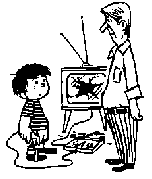When You Feel a YELL Coming On...
 Picture this. You have just spent all afternoon cleaning house. Your son
runs in without wiping his feet, leaving muddy footprints on the freshly waxed
kitchen floor.
Picture this. You have just spent all afternoon cleaning house. Your son
runs in without wiping his feet, leaving muddy footprints on the freshly waxed
kitchen floor.
You're furious; you let him have it. "How could you be so stupid?" you yell. "I've told you a thousand times to wipe your feet! When will you learn? Don't you ever think? You're hopeless!"
Now your son is angry, too.
"Hey, I didn't mean to! I hate you!"
"Don't you talk to me like that! Go to your room, young man!"
Later, when you calm down, you wish you could take it all back. You didn't mean the things you said. You don't really think he is stupid or hopeless. Those parenting classes you've taken have ideas for dealing with situations like this. If you hadn't started yelling, if you had stayed calm, maybe you could have tried some. You feel guilty for the ruined day, and for everyone's bad feelings. Next time you will stay calm and not get so angry! After all, you think, it's just a floor, and really not worth a fight.
But the fact is, you weren't calm. You were tired from working hard, and the thought of mopping the floor again was more than you wanted to face. You were at the end of your rope, too stressed to think rationally. No amount of telling yourself "not to get angry" would help.
So what can you do when sometimes you do get mad and yell in spite of your good intentions?
Consider another scene. In comes your muddy son. Instead of blaming or accusing, you yell, "I am furious! I worked all afternoon on that floor and now it's filthy! The last thing I want to do is mop that floor again!" You may yell this with all the volume and vehemence of before, but there is a difference! Instead of attacking your son, you are talking about how you feel.
"I-messages" are statements that begin with "I" and focus exclusively on how the speaker feels. They say nothing about the other person -- no accusing, no blaming, no name-calling. "I am angry about what happened." "When I see this, I feel furious." "When this happens, I feel hurt." These are all "I- messages."
When you use "I-messages," others do not need to defend against your accusations. Instead, they can think about how upset you are. A yelling match is less likely if people do not feel attacked and accused. Later, when you are calmer, you have less to apologize for. You may have made noise, but you didn't attack anyone personally.
If you don't let others know what angers or upsets you, they won't know what they can do to help. You may expect them to guess, and then feel resentful if they refuse or guess wrong.
If you use I-messages when you are angry, others do know how you feel. They are not so busy defending themselves, and are more likely to feel remorse and want to make amends.
I-messages don't come with a guarantee to change other people. Others may still feel attacked or blamed, but you will feel more positive about yourself and your part in the interaction. And you will have taken an important step to change your reactions.

Your comments and suggestions are welcome. E-mail me at dknowles@dknowles.net.
